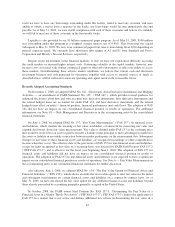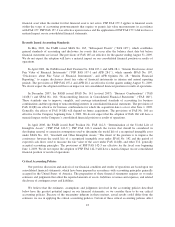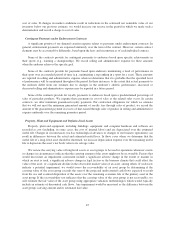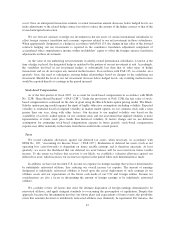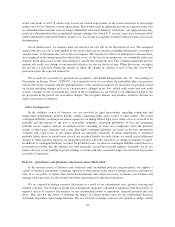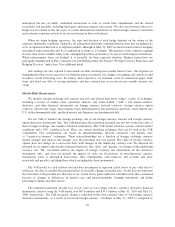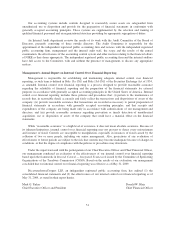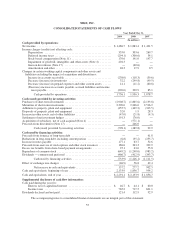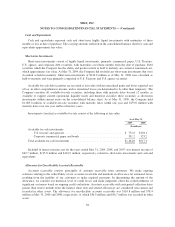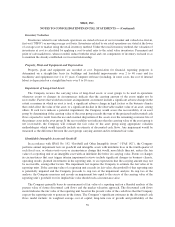Nike 2009 Annual Report Download - page 53
Download and view the complete annual report
Please find page 53 of the 2009 Nike annual report below. You can navigate through the pages in the report by either clicking on the pages listed below, or by using the keyword search tool below to find specific information within the annual report.Our accounting systems include controls designed to reasonably assure assets are safeguarded from
unauthorized use or disposition and provide for the preparation of financial statements in conformity with
generally accepted accounting principles. These systems are supplemented by the selection and training of
qualified financial personnel and an organizational structure providing for appropriate segregation of duties.
An Internal Audit department reviews the results of its work with the Audit Committee of the Board of
Directors, presently consisting of three outside directors. The Audit Committee is responsible for the
appointment of the independent registered public accounting firm and reviews with the independent registered
public accounting firm, management and the internal audit staff, the scope and the results of the annual
examination, the effectiveness of the accounting control system and other matters relating to the financial affairs
of NIKE as they deem appropriate. The independent registered public accounting firm and the internal auditors
have full access to the Committee, with and without the presence of management, to discuss any appropriate
matters.
Management’s Annual Report on Internal Control Over Financial Reporting
Management is responsible for establishing and maintaining adequate internal control over financial
reporting, as such term is defined in Rule 13a-15(f) and Rule 15d-15(f) of the Securities Exchange Act of 1934,
as amended. Internal control over financial reporting is a process designed to provide reasonable assurance
regarding the reliability of financial reporting and the preparation of the financial statements for external
purposes in accordance with generally accepted accounting principles in the United States of America. Internal
control over financial reporting includes those policies and procedures that: (i) pertain to the maintenance of
records that, in reasonable detail, accurately and fairly reflect the transactions and dispositions of assets of the
company; (ii) provide reasonable assurance that transactions are recorded as necessary to permit preparation of
financial statements in accordance with generally accepted accounting principles, and that receipts and
expenditures of the company are being made only in accordance with authorizations of our management and
directors; and (iii) provide reasonable assurance regarding prevention or timely detection of unauthorized
acquisition, use or disposition of assets of the company that could have a material effect on the financial
statements.
While “reasonable assurance” is a high level of assurance, it does not mean absolute assurance. Because of
its inherent limitations, internal control over financial reporting may not prevent or detect every misstatement
and instance of fraud. Controls are susceptible to manipulation, especially in instances of fraud caused by the
collusion of two or more people, including our senior management. Also, projections of any evaluation of
effectiveness to future periods are subject to the risk that controls may become inadequate because of changes in
conditions, or that the degree of compliance with the policies or procedures may deteriorate.
Under the supervision and with the participation of our Chief Executive Officer and Chief Financial Officer,
our management conducted an evaluation of the effectiveness of our internal control over financial reporting
based upon the framework in Internal Control — Integrated Framework issued by the Committee of Sponsoring
Organizations of the Treadway Commission (COSO). Based on the results of our evaluation, our management
concluded that our internal control over financial reporting was effective as of May 31, 2009.
PricewaterhouseCoopers LLP, an independent registered public accounting firm, has audited (1) the
consolidated financial statements and (2) the effectiveness of our internal control over financial reporting as of
May 31, 2009, as stated in their report herein.
Mark G. Parker Donald W. Blair
Chief Executive Officer and President Chief Financial Officer
51



